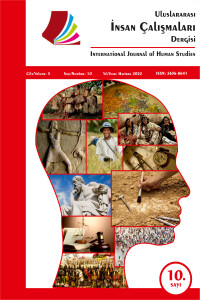Araştırma Makalesi
Yıl 2022,
Cilt: 5 Sayı: 10, 454 - 463, 31.12.2022
Öz
For thousands of years, the Chinese used complex Chinese script, which is today called "traditional writing" (繁体字). But this writing was very difficult to recognize, remember and write. Due to the decision to expand education after 1949, more than 2,000 Chinese characters in traditional writing were simplified by linguistic experts. The Simplified Chinese Script (简化字) is one of the official scripts used by the United Nations today. Wolfram Eberhard on numbers in his Dictionary of Chinese Symbols: "The importance given to number symbolism in ancient China is evident in the fact that each dynasty chooses its own number. Each numeric symbol refers to a system of real and unreal elements. And other numerical symbols can be associated with the same system. In China, the 'number' may change, as could any other." "change" lies at the heart of Chinese thought. Apart from their practical use, the numbers have shed light on how events have been held together over thousands of years and the changing cultural systems in which we can discern the rhythms of cosmic life." Since the Chinese language does not have an alphabet, the difficulty in writing Chinese characters necessitates rapid communication between people in the internet world in China in the new century. For this reason, the language of the numbers used on the internet in China has emerged. It is clearly seen that the Chinese pronunciation of the numbers evokes the character pronunciations of the Chinese word.
Kaynakça
- Aust,Stefan(Türkçesi:Erdinç ,Yücel,Hasan Yılmaz).(2018).Dijital Diktatörlük.Ankara, Hece Yayınları.
- Fischer, Roger Steven.(2022).Yazının Tarihi.İstanbul,İş Bankası Kültür Yayınları.
- Han,Cheng.(2002).Hanzı Baiwen.Shanghai, Shanghai GujiChubanshe.
- Han,Jiantang (Çeviren:Sibel Algan).(2020). Çin Yazı Karakterleri.İstanbul.Kaynak Yayınları.
- Tokuroğlu, Belma .(2015).Uygarlık Tarihi. Ankara, İmaj Yayınevi.
- Yıldırım, Cemal.(2020). Matematiksel Düşünce. Ankara, Remzi Kitabevim
- Nettle, Daniel (Çeviren:Ahmet Can Ay)(2021). Kaybolan Sesler.İstanbul, Profil Kitap.
- Kong, Shı Yong ve diğerleri.(2003). Xinciyudacıdian. Shanghai, Shanghai cishu chubanshe.
- İnal,Kemal.(2012). Dil ve Politika. Ankara, Ütopya Yayınevi.
- Ren ,Xiaosi.(2020). Çin Nereye Gidiyor,.İstanbul, İpek Yolu.
- Eberhard, Wolfram .(2000). Çin Simgeleri Sözlüğü, İstanbul, Kabalcı Yayınevi.
- Crystal,David.(2020). Dilin Kısa Tarihi.İstanbul,Alfa
Yıl 2022,
Cilt: 5 Sayı: 10, 454 - 463, 31.12.2022
Öz
Çinliler binlerce yıl boyunca bugün “geleneksel yazı”(繁体字 ) olarak adlandırılan karmaşık Çin yazısını kullandılar. Fakat bu yazının tanınması, hatırlanması ve yazılması çok zordu. 1949 yılından sonra eğitimin yaygınlaştırılması kararı nedeniyle geleneksel yazıdaki 2 binden fazla Çince karakter, dil uzmanları tarafından basitleştirildi. Basitleştirilmiş Çin Yazısı (简化字) bugün Birleşmiş Milletler tarafından kullanılan resmi yazılardan biridir. Wolfram Eberhard, Çin Simgeleri Sözlüğünde sayılar hakkında: “ Eski Çin’de sayı sembolizmine verilen önem, her hanedanın kendi sayısını seçmesiyle açıkça görülür. Her sayısal simge, gerçek ve gerçek olmayan unsurlar sistemine gönderme yapar.Ve diğer sayısal simgeler de aynı sistemle bağdaştırılabilir. Çin’de “sayı” da diğer şeyler gibi değişime uğrayabilir. “Değişim” Çin düşüncesinin temelinde yatar. Pratik kullanımları dışında sayılar, Çinlilere binlerce yıl boyunca olayların nasıl bir arada tutulduğuna ve kozmik hayatın ritimlerini ayırt edebileceğimiz değişen kültürel sistemlere ışık tutmuştur” şeklinde bahsetmektedir. Çin dilinin alfabesi bulunmadığı için, Çince karakterleri yazmadaki zorluk, yeni yüzyılda Çin’de internet dünyasında insanlar arası hızlı iletişimi zorunlu kılmaktadır. Bu nedenle Çin’de internet ortamında kullanılan sayıların dili ortaya çıkmıştır. Sayıların Çince okunuşlarının, Çince kelimenin karakter okunuşlarını çağrıştırdığı net şekilde görülmektedir:
Kaynakça
- Aust,Stefan(Türkçesi:Erdinç ,Yücel,Hasan Yılmaz).(2018).Dijital Diktatörlük.Ankara, Hece Yayınları.
- Fischer, Roger Steven.(2022).Yazının Tarihi.İstanbul,İş Bankası Kültür Yayınları.
- Han,Cheng.(2002).Hanzı Baiwen.Shanghai, Shanghai GujiChubanshe.
- Han,Jiantang (Çeviren:Sibel Algan).(2020). Çin Yazı Karakterleri.İstanbul.Kaynak Yayınları.
- Tokuroğlu, Belma .(2015).Uygarlık Tarihi. Ankara, İmaj Yayınevi.
- Yıldırım, Cemal.(2020). Matematiksel Düşünce. Ankara, Remzi Kitabevim
- Nettle, Daniel (Çeviren:Ahmet Can Ay)(2021). Kaybolan Sesler.İstanbul, Profil Kitap.
- Kong, Shı Yong ve diğerleri.(2003). Xinciyudacıdian. Shanghai, Shanghai cishu chubanshe.
- İnal,Kemal.(2012). Dil ve Politika. Ankara, Ütopya Yayınevi.
- Ren ,Xiaosi.(2020). Çin Nereye Gidiyor,.İstanbul, İpek Yolu.
- Eberhard, Wolfram .(2000). Çin Simgeleri Sözlüğü, İstanbul, Kabalcı Yayınevi.
- Crystal,David.(2020). Dilin Kısa Tarihi.İstanbul,Alfa
Toplam 12 adet kaynakça vardır.
Ayrıntılar
| Birincil Dil | Türkçe |
|---|---|
| Konular | Sanat ve Edebiyat |
| Bölüm | Makaleler |
| Yazarlar | |
| Yayımlanma Tarihi | 31 Aralık 2022 |
| Gönderilme Tarihi | 29 Kasım 2022 |
| Kabul Tarihi | 31 Aralık 2022 |
| Yayımlandığı Sayı | Yıl 2022 Cilt: 5 Sayı: 10 |



